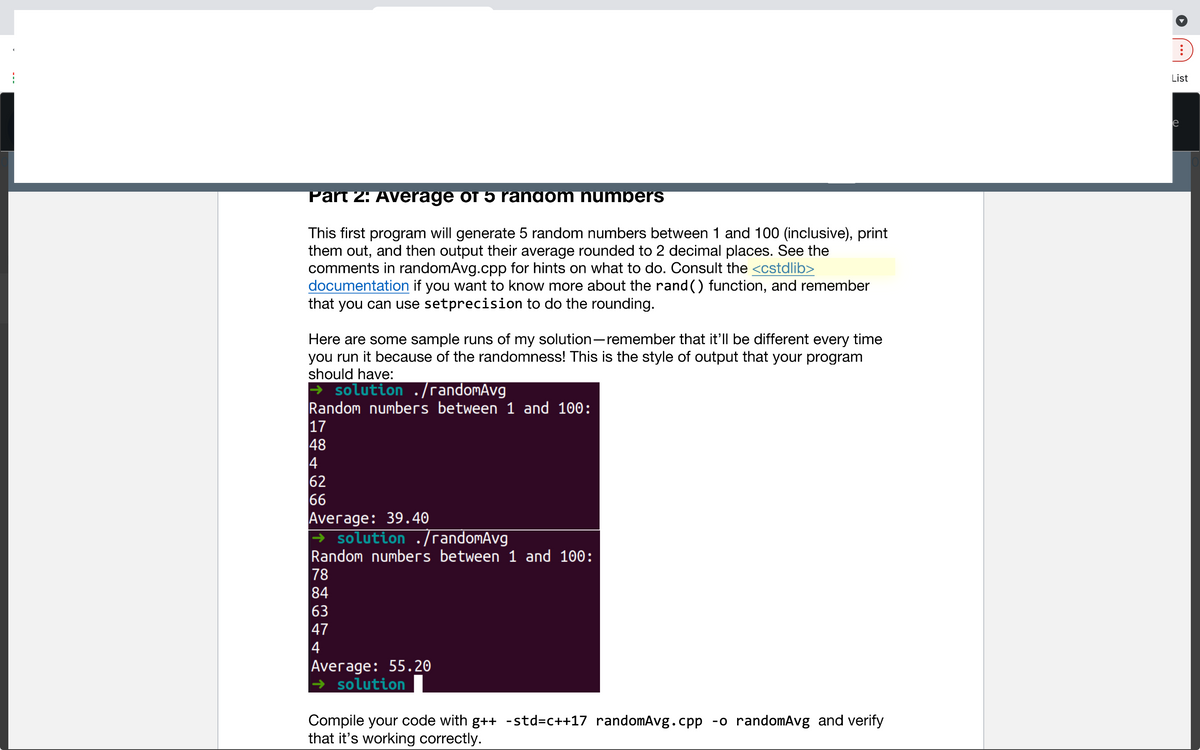This first program will generate 5 random numbers between 1 and 100 (inclusive), print them out, and then output their average rounded to 2 decimal places. See the comments in randomAvg.cpp for hints on what to do. Consult the documentation if you want to know more about the rand() function, and remember that you can use setprecision to do the rounding. Here are some sample runs of my solution-remember that it'll be different every time you run it because of the randomness! This is the style of output that your program should have: > solution ./randomAvg
This first program will generate 5 random numbers between 1 and 100 (inclusive), print them out, and then output their average rounded to 2 decimal places. See the comments in randomAvg.cpp for hints on what to do. Consult the documentation if you want to know more about the rand() function, and remember that you can use setprecision to do the rounding. Here are some sample runs of my solution-remember that it'll be different every time you run it because of the randomness! This is the style of output that your program should have: > solution ./randomAvg
C++ for Engineers and Scientists
4th Edition
ISBN:9781133187844
Author:Bronson, Gary J.
Publisher:Bronson, Gary J.
Chapter6: Modularity Using Functions
Section6.4: A Case Study: Rectangular To Polar Coordinate Conversion
Problem 9E: (Numerical) Write a program that tests the effectiveness of the rand() library function. Start by...
Related questions
Question
using C++

Transcribed Image Text:List
e
Part 2: Average of 5 random humbers
This first program will generate 5 random numbers between 1 and 100 (inclusive), print
them out, and then output their average rounded to 2 decimal places. See the
comments in randomAvg.cpp for hints on what to do. Consult the <cstdlib>
documentation if you want to know more about the rand () function, and remember
that you can use setprecision to do the rounding.
Here are some sample runs of my solution-remember that it'll be different every time
you run it because of the randomness! This is the style of output that your program
should have:
> solution ./randomAvg
Random numbers between 1 and 100:
17
48
4
62
66
Average: 39.40
→ solution ./randomAvg
Random numbers between 1 and 100:
78
84
63
47
4
Average: 55.20
→ solution
Compile your code with g++ -std=c++17 randomAvg.cpp -o randomAvg and verify
that it's working correctly.
Expert Solution
This question has been solved!
Explore an expertly crafted, step-by-step solution for a thorough understanding of key concepts.
This is a popular solution!
Trending now
This is a popular solution!
Step by step
Solved in 4 steps with 2 images

Knowledge Booster
Learn more about
Need a deep-dive on the concept behind this application? Look no further. Learn more about this topic, computer-science and related others by exploring similar questions and additional content below.Recommended textbooks for you

C++ for Engineers and Scientists
Computer Science
ISBN:
9781133187844
Author:
Bronson, Gary J.
Publisher:
Course Technology Ptr

C++ for Engineers and Scientists
Computer Science
ISBN:
9781133187844
Author:
Bronson, Gary J.
Publisher:
Course Technology Ptr